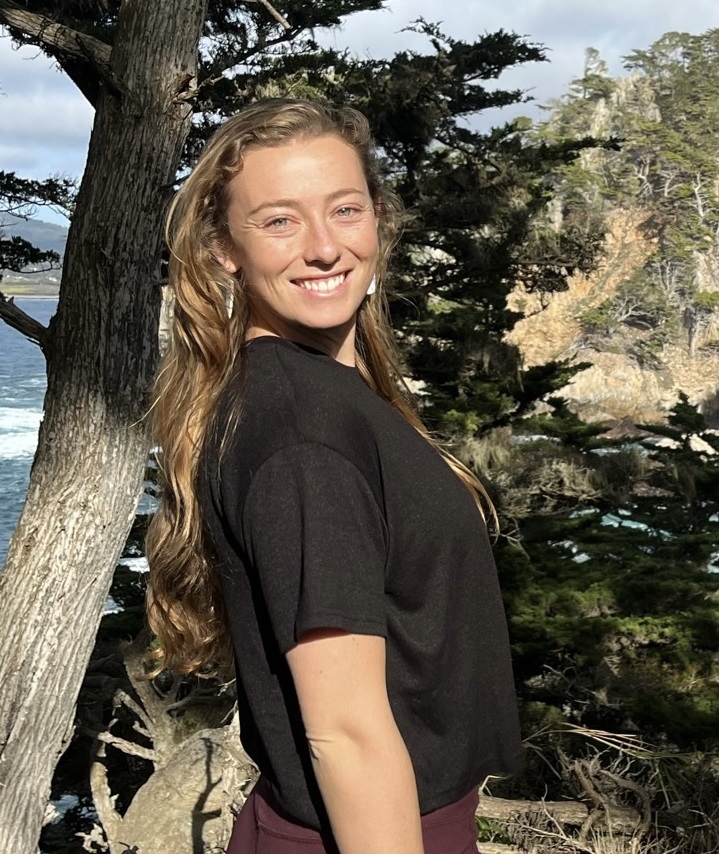
Lily Nugent is the Food Safety and Compliance Manager at Coke Farm. She serves on the CCOF Board.
Lily’s relationship with organic began at a very young age: “My mom always made a huge effort to buy organic and teach us the value of eating a wide variety of foods with high nutritional value,” she recalls. “She instilled a connection to food and land, prioritizing buying organic and inspiring my sister and I to find love in the kitchen.”
Growing up on land above Elkhorn Slough Estuary and surrounded by conventional strawberry fields, Lily appreciated both the beauty of nature and the diverse challenges of growing food on a commercial scale. “On our drive home from school, when they’d be spraying the strawberry fields [with pesticides], my mom would tell us to hold our breath.” The family talked about how to stay safe—not walking around the fields following pesticide applications—while acknowledging the unique challenges growers face to produce a crop we all enjoy.
The twin understandings of nature and commerce shaped Lily’s experience of the world. “I have been so blessed to live in an area where I am able to immerse in nature and observe firsthand the effects of the farming industry on the surrounding ecosystem, all while participating in the agricultural industry in unique and interesting ways.”
“Feeling connected to the land I grew up on and understanding the dynamic between food production and the natural environment was a big part of my experience growing up. As a society, we’re so disconnected from these systems, but also dependent on them to put food on the table and support healthy living environments.”
Lily studied environmental science and economics at the University of Hawaiʻi at Mānoa, closely examining how economics could interact more fluidly with nature. “I wanted to look at societal structures and the financial ecosystems of the industries we depend on and explore how we could leverage values to support natural resource management,” she says. “Through understanding stakeholder incentives, we can balance the utility of land to produce food, support recreational areas, and preserve wildlife habitat.”
Lily connected with North Shore Economic Vitality Partnership (NSEVP), a nonprofit investigating how to support rural communities on the North Shore of Oahu. “One of the key elements that we found was missing was the infrastructure between small-scale growers, like family farms, and access to local markets. That missing infrastructure was something NSEVP was developing staff and programs to support.” For her senior project, Lily wrote a business plan to aid in acquiring funds to build a regional food hub that would serve small to midsize growers across Oahu and increase access to locally grown food in her community.
As a result of the plan, upon her graduation Lily was hired to support food safety initiatives that prepare growers to meet customer compliance requirements. “Alongside an awesome team, I was able to support the development of a USDA Group GAP cohort that spanned across the Hawaiian Islands.” Growers in Hawaii face a unique set of challenges in obtaining necessary food safety and organic certifications due to the geographic isolation and lack of inspectors and support staff living on the island to conduct audits. Programs like Group GAP reduce these burdens by spreading out the costs of flying in inspectors and managing a Quality Management System (QMS) amongst a group of growers. Lily says, “That was my first hands-on introduction to regional food systems and the need for more infrastructure and support.”
Lily now works for Coke Farm as the food safety and compliance manager, a job she loves. “It’s a great fit with my values,” she says. “I am able to support small family farmers and regional food systems and create a more wholesome supply chain. I get a unique perspective of the needs and constraints of local growers and how organizations like Coke Farm can better support them to continue to produce local and organic product.”
Already familiar with CCOF from her role at Coke Farm, Lily was thrilled when her mentor Christine Cattin Coke suggested she pursue a role on the CCOF Board. Through her position at Coke Farm and her proximity to growers, Lily provides transparency to CCOF’s leaders about the needs and values of its members. “This position allows me to represent the folks doing the hard work out there every day, fighting the weather and dealing with fluctuating markets, increased regulatory burden, and shrinking margins. I take this position very seriously and strive to make an impact that will make the lives of our food producers just a little bit easier.”
